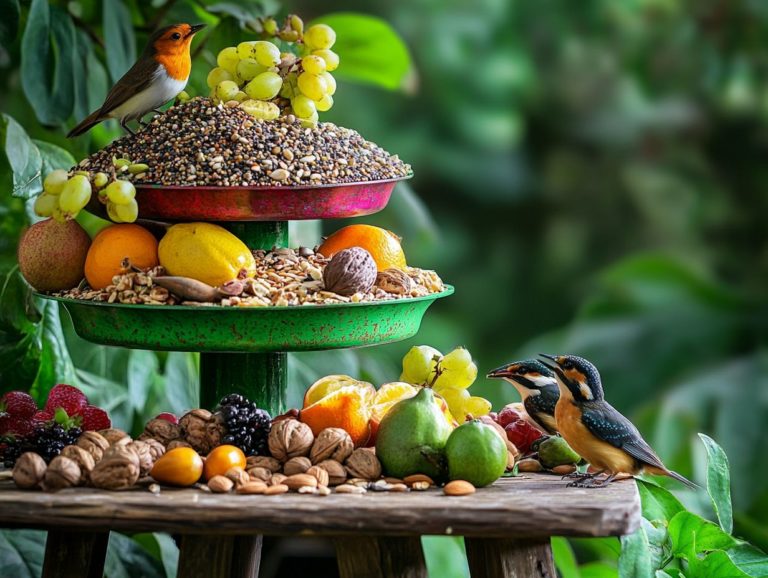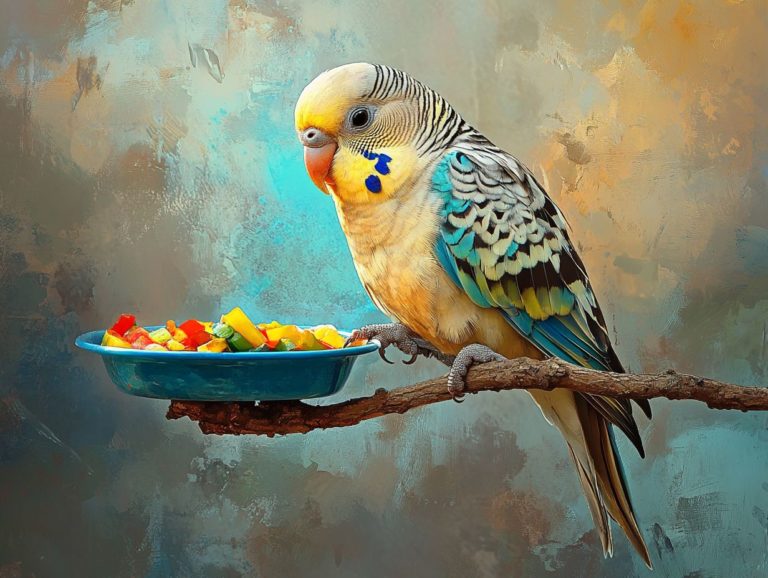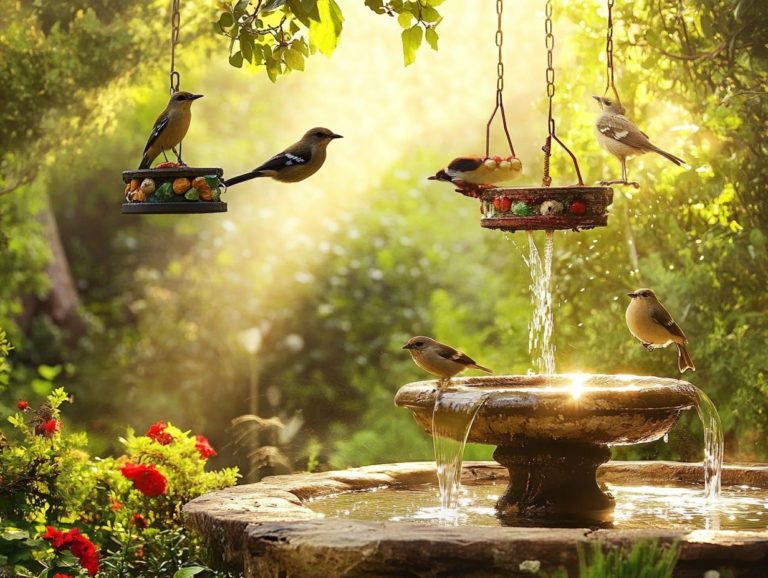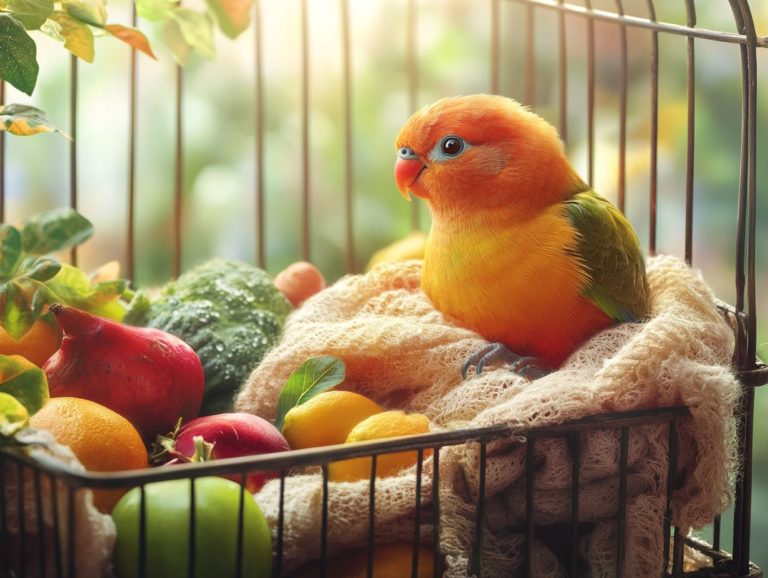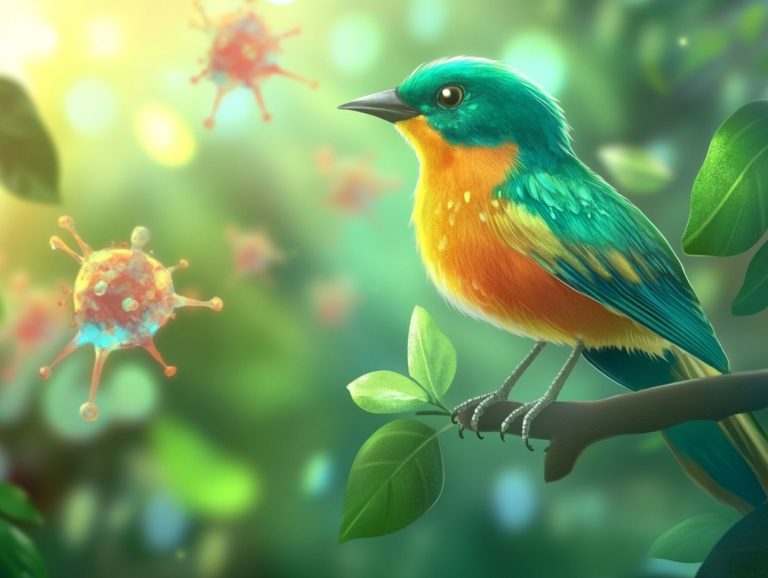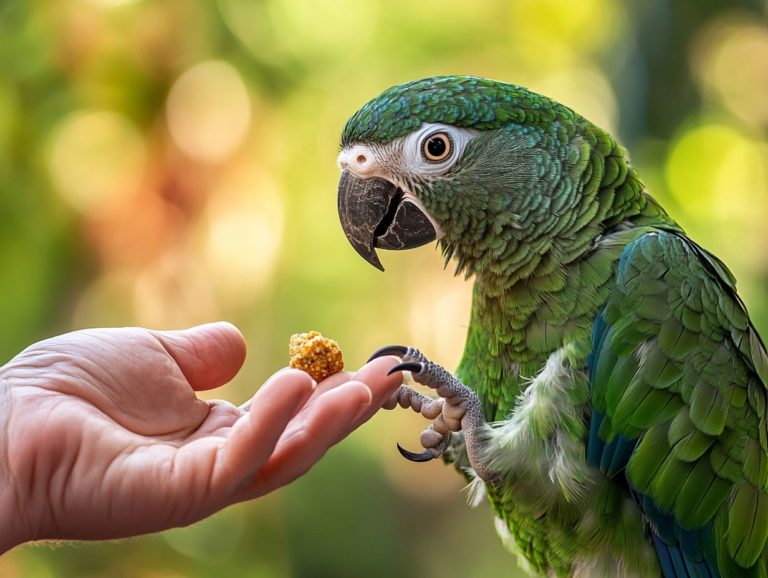How to Help Your Bird Adjust to Change
Birds thrive on routine, and any disruption can lead to stress and behavioral issues. Understanding how your feathered friend adapts to daily patterns is essential, especially during significant life changes like moving to a new home. Birds, such as budgies and cockatiels, often require specific adjustments to help them feel secure.
Let s jump into the common challenges birds face and how you can help them thrive! This article outlines effective strategies for helping your avian companion cope, such as creating a safe space and recognizing when to seek professional assistance.
Dive in to discover how you can ensure a smooth transition for your beloved bird.
Contents
- Key Takeaways:
- Understanding the Importance of Routine for Birds
- Common Changes that Birds Struggle with
- Preparing Your Bird for Change
- Helping Your Bird Adjust to Change
- Dealing with Resistance and Behavioral Changes
- Seeking Professional Help if Needed
- Frequently Asked Questions
- How can I help my bird adjust to a new cage?
- What should I do if I need to move to a new home with my bird?
- How can I help my bird adjust to a new family member?
- What should I do if my bird’s routine is disrupted by a change in schedule?
- How can I help my bird adjust to a new environment?
- What should I do if my bird seems stressed during a change?
Key Takeaways:
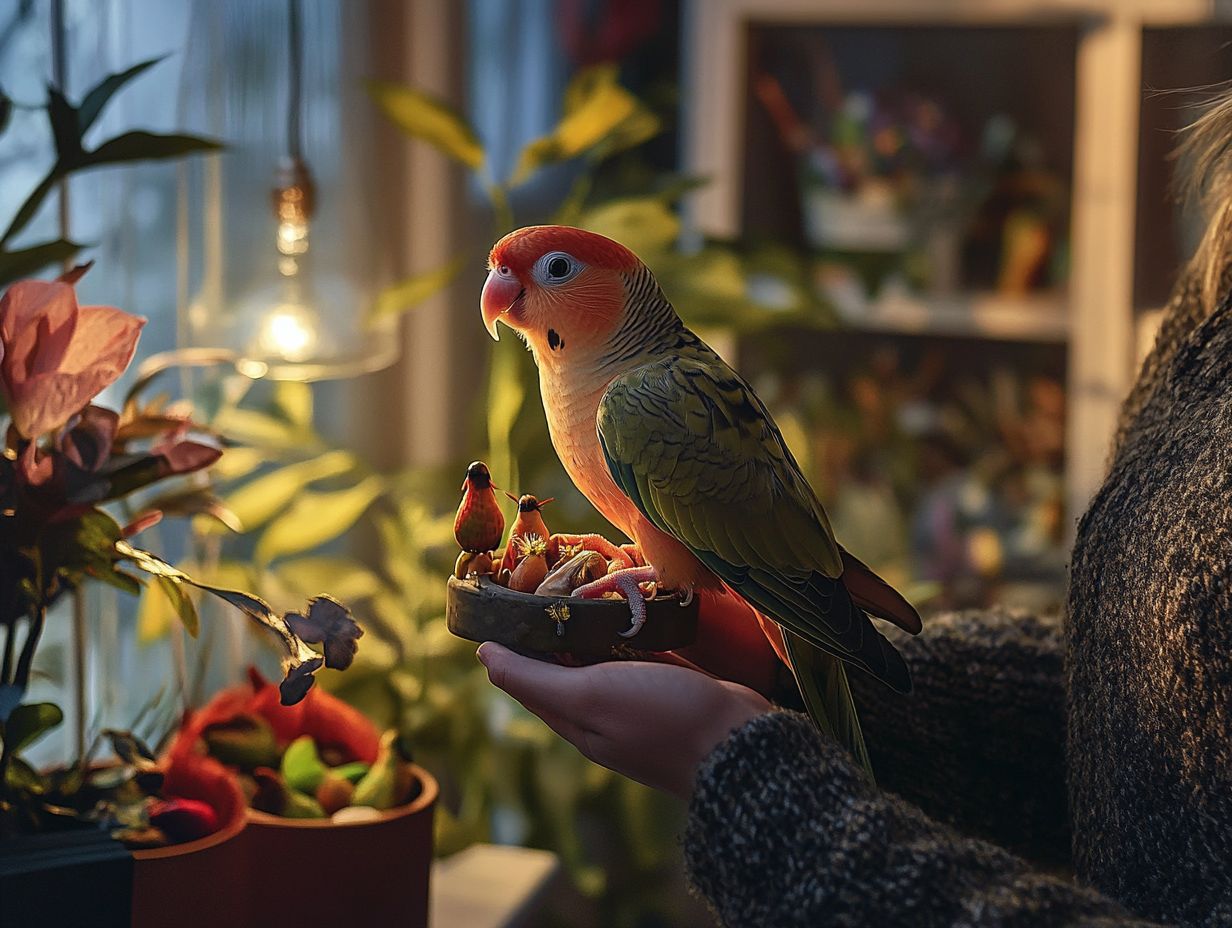
- Routine is vital: It keeps birds happy and secure.
- Moving homes? Take it slow to help your bird adjust.
- Create a cozy environment: Make transitioning easier.
Understanding the Importance of Routine for Birds
Establishing a routine is essential for the well-being and emotional stability of birds, such as budgies, cockatiels, and conures. A well-structured routine can be a game-changer, especially when it comes to taming fearful or hostile birds.
Think of this routine as your roadmap it includes feeding times, social interactions, and training sessions that incorporate techniques recommended by bird experts like Karen Trinkaus. This might involve introducing wooden dowels and playstands to encourage exploration. By crafting a predictable environment, you can significantly reduce stress and anxiety in your feathered companions, resulting in healthier emotional responses and a more seamless training experience.
How Birds Adapt to Routine
Birds thrive on routine, as consistent exposure to specific activities and environments enhances their taming process. This adaptability not only instills a sense of security in their daily lives but also contributes to the development of their thinking skills, especially through engaging in nonthreatening activities.
Consider the impact of training techniques like positive reinforcement, which means rewarding good behavior. When you implement these methods, your birds begin to associate certain behaviors with rewards, such as tasty millet or nuts, leading to improved communication and a stronger bond. Established routines can spark emotional responses, with your birds exhibiting excitement or contentment during familiar activities.
By observing their reactions, you gain valuable insights into their emotions, ultimately fostering a more harmonious living environment for both your feathered friends, including African greys, and yourself.
Common Changes that Birds Struggle with
Birds, particularly those that are timid or have experienced mistreatment, such as used birds, often find it challenging to adjust to shifts in their environment. To help them adapt, consider following socialization tips for newly adopted birds, as such changes can provoke heightened emotional reactions.
Common scenarios like moving to a new home, welcoming new pets, or even minor alterations to their daily routine can stir up anxiety and hostility in these sensitive creatures. It’s important to recognize the signs of stress in pet birds and how to help, especially when welcoming fearful birds, which may require more careful adjustments.
Start today to create a nurturing space for your bird! Feel free to share your experiences or ask any questions about bird care.
Moving to a New Home
Moving can be stressful for your birds. They may react emotionally to new surroundings.
These sensitive creatures encounter a whirlwind of new sounds, sights, and smells. This can easily overwhelm them.
Look for signs of stress, like increased vocalizations or changes in eating habits. Offering familiar items, like millet, can help ease their anxiety.
To help with this transition, consider ways to build trust, using training tools like clickers, which are small devices that make a sound to mark good behavior, and treats. Establishing a consistent routine will help them adjust more comfortably, creating a sense of safety in their new environment.
Gradually introduce new elements of the space to allow your birds to explore at their own pace. Additionally, using a travel cage for brief outings can help, along with tips for teaching birds to be confident, to make the transition smoother.
Preparing Your Bird for Change
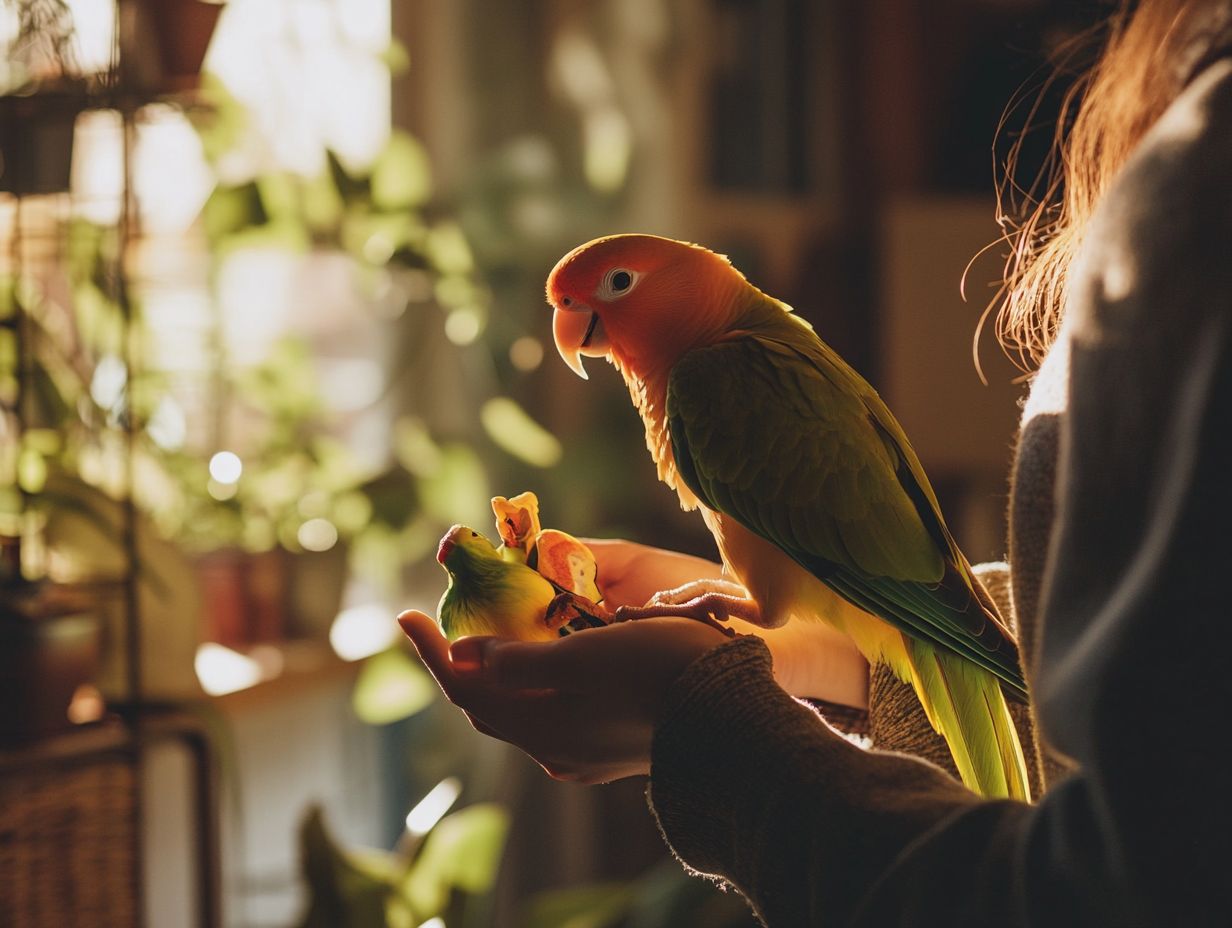
Preparing your bird for change requires a thoughtful approach that includes gradual introductions and familiarization techniques. These techniques are designed to cultivate a sense of safety and comfort, including utilizing travel cages for consistent experiences, as outlined in how to modify your bird’s behavior.
By incorporating getting your bird comfortable with your hand and offering healthy snacks like grapes or nuts, you can gently ease your bird into new experiences. This approach alleviates fear while nurturing a bond of trust.
Helping Your Bird Adjust to Change
To help your bird adapt, creating a safe and comfortable environment is vital. Additionally, learning how to prepare your bird for a diet change and establishing a new routine that promotes emotional stability enhances your bird’s sense of security and well-being, especially for socialized birds that thrive on interaction.
Creating a Safe and Comfortable Environment
Creating a safe and comfortable environment for your bird starts with setting up a dedicated taming room. This room should be complete with a playstand and easy access to a travel cage filled with healthy snacks like millet and nuts.
In this specially designed space, enrich the atmosphere with various perches and engaging toys. This setup allows your bird to explore and enjoy mental stimulation. A well-structured taming room minimizes distractions and promotes a stress-free setting, enhancing the bond between you and your feathered friend.
Providing an array of activities can also help mitigate anxiety-related behaviors. It’s essential to ensure that the travel cage is both safe and spacious. This is especially important during outings, as it provides secure travel without sacrificing comfort.
By supplementing this environment with nutritious snacks, like millet and grapes, you create a haven where your companion can truly thrive and feel right at home!
Establishing a New Routine
Establishing a new routine is crucial for birds to adapt. It fosters trust and cultivates a positive emotional connection with their caregivers through consistent interactions and activities.
Creating a structured environment with consistent feeding times and interaction schedules helps your bird feel secure. Incorporating training tools like clickers and healthy snacks can greatly enhance this process, offering clear communication and reinforcing desirable behaviors.
Acknowledge their achievements through these methods. You ll see your bird s confidence soar, making them more open to learning and bonding with you, especially during fun activities.
A well-organized setup that includes appropriate toys and perches keeps your feathered friends engaged. This reduces anxiety and encourages exploration all while solidifying that crucial bond of trust. Incorporating new training techniques can enhance their overall experience.
Dealing with Resistance and Behavioral Changes
Navigating resistance and behavioral changes in birds, especially those that display aggression or anxiety, requires a keen understanding of the underlying causes. Identifying triggers in their environment is crucial.
Employ effective taming techniques, including trust-building exercises, to foster a more harmonious relationship with your avian companions. Consider working with an avian behaviorist for tailored strategies.
Addressing Aggression and Anxiety
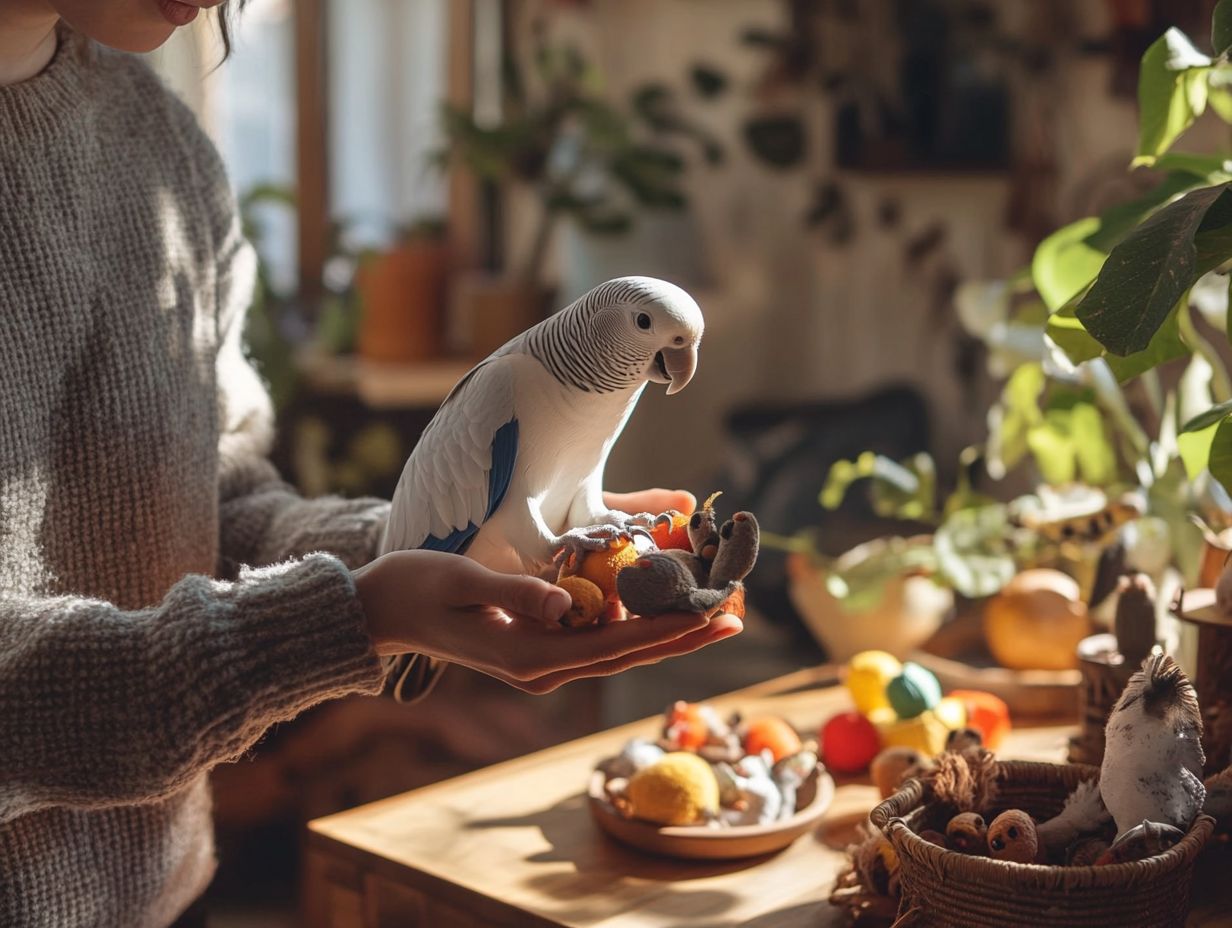
Addressing aggression and anxiety in birds often requires specialized taming techniques and the expertise of an avian behaviorist. This is particularly important when dealing with fearful or used birds. These professionals recommend various methods to create a trusting environment, such as gradual exposure to new experiences and positive reinforcement training.
Start introducing new experiences right away and reward calm behavior with treats or praise, like millet or healthy fruits. This helps your birds learn to associate human interaction with positive outcomes. Providing a stable habitat filled with enrichment, such as toys and perches, greatly enhances their emotional well-being.
Understanding their body language is essential. This enables you to recognize signs of stress and respond appropriately. Ultimately, combining these approaches, along with advice from avian behaviorists and other experts, can lead to happier and more well-adjusted avian companions.
Seeking Professional Help if Needed
Should behavioral issues continue despite your diligent efforts, it may be wise to seek professional assistance. This often means consulting a veterinarian or an avian behaviorist. They can provide personalized guidance and issue a health certificate to ensure your bird is fit for any new environments.
When to Consult a Veterinarian or Trainer
Knowing when to consult a veterinarian or a trainer is essential, especially when facing persistent behavioral issues that might hint at underlying health concerns, particularly in used birds.
Look for signs like drastic changes in eating habits, lethargy, or unusual vocalizations. These can be crucial indicators that it s time for professional intervention. If your bird starts displaying self-destructive behaviors, such as excessive feather plucking or aggression toward its surroundings, reaching out to an avian behaviorist could provide valuable insights into its needs. Offering healthy treats can also help reduce stress during this period.
Obtaining a health certificate not only confirms that your bird is physically fit but also aids in diagnosing any potential illnesses. Ultimately, collaborating with trained professionals, including avian behaviorists, can deepen your understanding of your bird s needs, fostering a healthier and more harmonious relationship with your feathered companion.
Frequently Asked Questions
How can I help my bird adjust to a new cage?
To help your bird adjust to a new cage, start by gradually introducing them to it. Place familiar items from their old cage in the new one to make them feel more at home. Additionally, you can learn more about how to prepare your home for a new bird to ensure a smooth transition. Spend time with your bird near the new cage to help them become comfortable with it.
What should I do if I need to move to a new home with my bird?
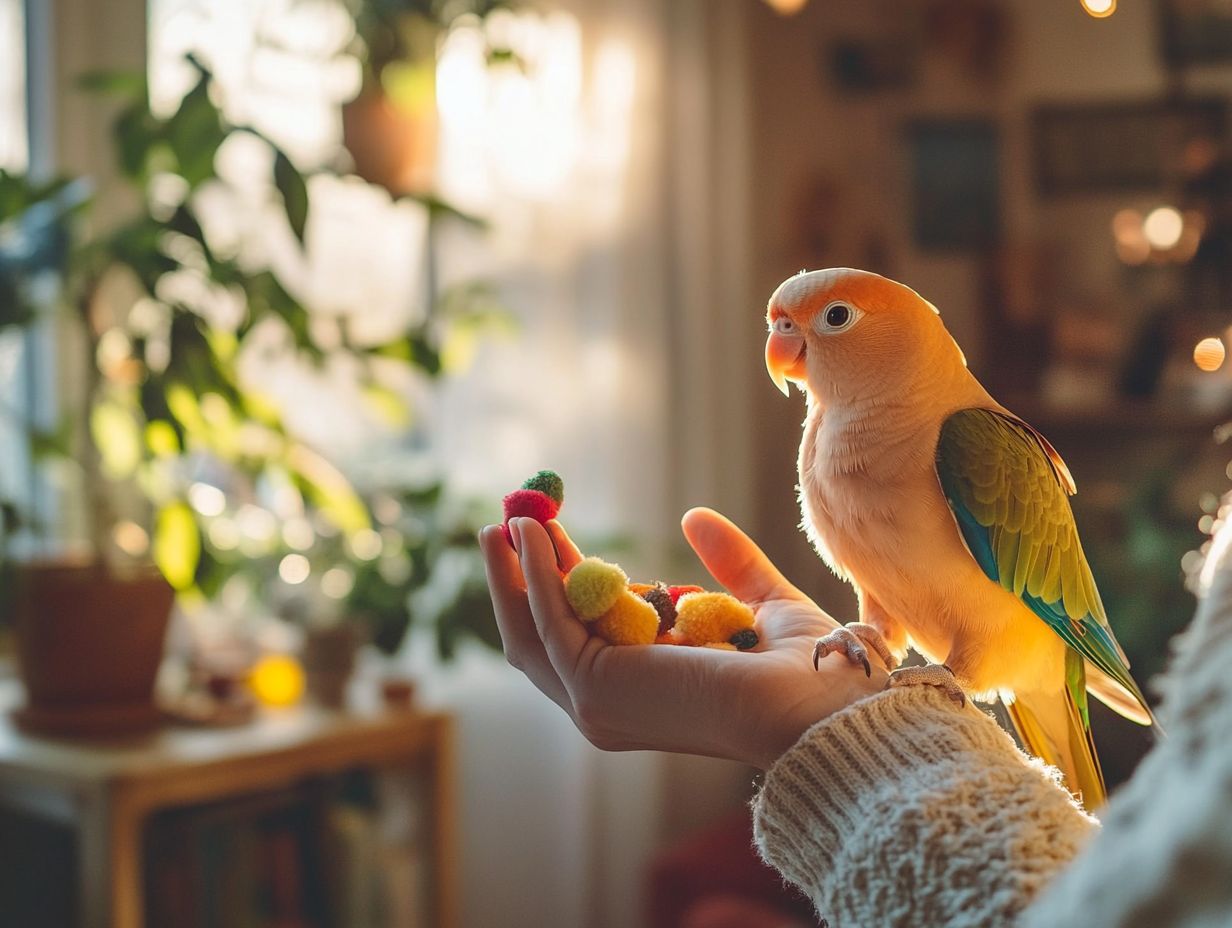
When moving to a new home with your bird, keep their routine as consistent as possible. This includes keeping their cage in the same location and maintaining their usual feeding and playtimes. Additionally, consider transitioning your pet birds to new foods gradually to minimize stress. Try playing soothing music or using calming pheromones to help ease their stress during the move.
Have more questions? Reach out for help!
How can I help my bird adjust to a new family member?
When a new family member arrives, like a baby or pet, introduce them to your bird slowly. Supervise the process to ensure your bird feels safe. Give extra attention and treats during this time!
What should I do if my bird’s routine is disrupted by a change in schedule?
To maintain your bird’s well-being, keep feeding and playtimes consistent. You can also check resources on how to train your bird to stay calm by providing new toys or treats to keep them engaged and help ease any stress.
How can I help my bird adjust to a new environment?
To make your bird feel at home, create a safe space, like their cage. Introduce new areas gradually and offer many chances for play and exercise!
What should I do if my bird seems stressed during a change?
Give your bird time to adjust and offer comfort during transitions. If problems persist, consider exploring ways to help your bird overcome fear or consult a veterinarian or bird behavior expert for advice!

